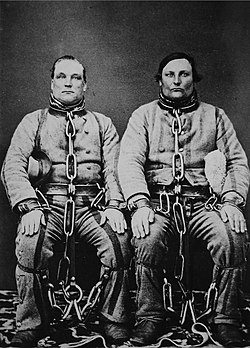
Back Tronkstraf Afrikaans سجن (فعل) Arabic Həbs Azerbaijani Лишаване от свобода Bulgarian কারাদণ্ড Bengali/Bangla Gefangenschaft German Enprizonigo Esperanto Encarcelamiento Spanish Vangistus Estonian حبس Persian
| Criminal procedure |
|---|
| Criminal trials and convictions |
| Rights of the accused |
| Rights of the victim |
| Verdict |
| Sentencing |
| Post-sentencing |
| Related areas of law |
| Portals |
|

Imprisonment or incarceration is the restraint of a person's liberty for any cause whatsoever, whether by authority of the government, or by a person acting without such authority. In the latter case it is considered "false imprisonment". Imprisonment does not necessarily imply a place of confinement with bolts and bars, but may be exercised by any use or display of force (such as placing one in handcuffs), lawfully or unlawfully, wherever displayed, even in the open street. People become prisoners, wherever they may be, by the mere word or touch of a duly authorized officer directed to that end. Usually, however, imprisonment is understood to imply actual confinement against one's will in a prison employed for the purpose according to the provisions of the law.[1] Generally gender imbalances occur in imprisonment rates, with incarceration of males proportionately more likely than incarceration of females.[2]
Although reforms have targeted conditions of imprisonment on human rights grounds, imprisonment itself and the length of sentences has largely escaped scrutiny on human rights grounds despite similar evidence for its harm compared to recognized forms of ill-treatment and torture.[3][4] Prison abolition is a growing movement but has not become a mainstream position, despite the criticism of mass incarceration in the United States and the defund the police movement.[5]
- ^ "Imprisonment". The New International Encyclopedia. Second Edition. Dodd, Mead and Company. New York. 1915. Volume XII. Page 35.
- ^ Codd, Helen (Winter 2013). "WOMEN AND IMPRISONMENT". Wagadu, Journal of Transnational Women's and Gender Studies. 11.
- ^ Oette 2024, pp. 51, 85, 87–93.
- ^ Cakal 2023, pp. 248, 250.
- ^ Oette 2024, pp. 92, 93.